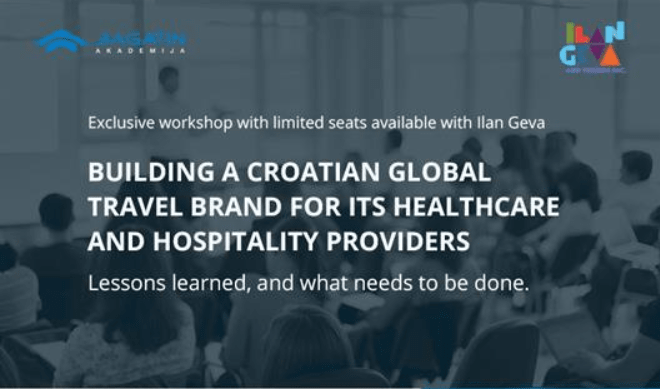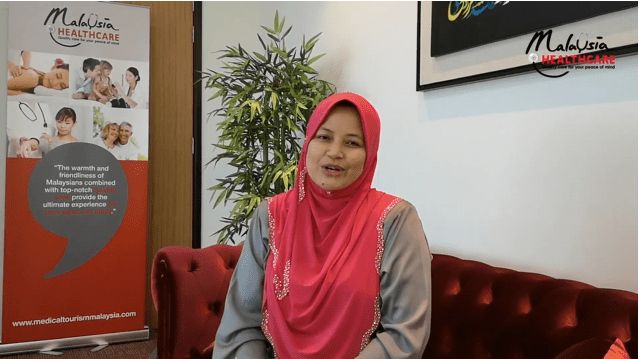November 6, 2018 - These are exciting times for the Croatian medical tourism industry, and while there seems to be little interest from the State authorities, the leading private clinics in the Croatian medical tourism industry are pushing forward, engaging the help of leading world experts in health travel to help them grow.
Life running Total Croatia News is full of diversity, and no two days are the same. Given the growing reach of TCN these days (now the number-one-searched website in the world for news about Croatia), we tend to cover an increasing number of diverse topics. As digital nomads, the chance to work remotely gives us more freedom to cover all aspects of life in Croatia. And so while the weekend was spent picking olives in the family field and reporting on the natural way of life in Dalmatia, Monday morning brought me to Zagreb for a niche seminar organised by the Croatian medical tourism industry.
As followers of TCN will note, the potential of the Croatian medical tourism industry is one of my big discoveries in recent years. Here, in a country which welcomes 18 million tourists a year and whose GDP includes 20% from tourism, Croatia has a world-class tourism product which is hardly being marketed at all by its tourism gurus. Examples of the world-class Croatian medical tourism product lie, for example, in Mayo Clinic's co-founded pharmacogenetic OneOme project choosing St Catherine Specialty Hospital as its European partner for its ground-breaking RightMed test; no less than three Zagreb clinics named in the top six in Europe for dermatology, including Bagatin Clinic in first place; and Eye Clinic Svjetlost winning 'Best Live Surgery Award" at the "ophthalmology Oscars" in Milan, where a team of four expert surgeons performed 5 complicated eye surgeries in 60 minutes at the world's largest video surgeon congress, VideoCatarattaRefrattiva. If you are interested in learning more about Croatian medical tourism, here are 25 things to know.
I recently interviewed one of the big speakers on the global health travel circuit, and his global perspective of the potential of the Croatian medical tourism industry was one more piece in the jigsaw for this correspondent. You can read the thoughts of Dr. Prem Jagyasi here.
The leaders in the Croatian medical tourism industry are undoubtedly Bagatin Clinic and St Catherine Specialty Hospital, whose efforts on the international stage have done much to put Croatia on the health tourism map worldwide, and the potential for growth in this sector is enormous, an obvious area for Croatia to expand its stated aim to become a 12-month destination.
And yet...
Croatian Medical Tourism: Are the Tourism Chiefs Interested at All?
Yesterday's Croatian medical tourism seminar in Zagreb was organised by Bagatin Clinic, bringing together the key elements in the industry for a workshop with health travel branding guru, Ilan Geva. I was delighted to be invited to cover the event. It is one thing writing about the potential of a sector of Croatian tourism, but it is quite another to get an open and honest appraisal of Croatia's potential from one of the world authorities.
Despite being invited, not one person from the Ministry of Tourism attended.
Despite being invited, not one person from the Croatian National Tourist Board attended.
This lack of attendance was in stark contrast to another conference I attended recently - Days of Croatian Tourism on Hvar - where I would be surprised if anyone from thise two State bodies did NOT attend. Two days of fun travelling down to a beautiful island is a lot more appealing than a 5-minute drive to help build Croatia's future.
In a room full of the top players in the Croatian medical travel industry, with perhaps the world's leading guru on health tourism branding leading a niche seminar on how Croatia should brand its health tourism, a niche tourism sector where Croatia has the potential to be a top 10 global player bringing billions to the economy. And not one representative from the Ministry of Tourism or Croatian National Tourist Board could attend. I am sure that the justification will be that there was an office to open in Shanghai and the World Travel Market in London, but with all the people employed, was there really nobody who could have come?
It should be noted that there were two officials there - the Deputy Director of the Zagreb Tourist Board and an Assistant Minister of Health who, to his credit, lasted almost the whole day and not just the usual 15-minute photo op at the opening, as is usually the casewith politicians the world over.
Geva put his engaged audience through its paces, and it was an excellent exercise for those attending to look at the strengths and weaknesses of their own brand, as well as how Croatia should looking to build its national health tourism brand. Geva said that there are about 100 countries in the world which practice medical tourism, a number he thinks will be reduced to 50 by 2050. Of these, Gera believes there will be a 'Premier League' of about 20 countries offering quality health tourism, and Croatia could be in that elite league, even in the top 10, which is the stated goal of Bagatin Clinic CEO, Ognjen Bagatin.
"But you need to all come together to build that strategy."
Perhaps someone can pass the message on to the Ministry of Tourism and Croatian National Tourist Board.
Croatian Medical Tourism: Can We All Work Together?
While branding was the topic of the day, it was the other things that Geva talked about that interested me even more. Which country, for example, does medical tourism best, and what are the best practices?
"Malaysia, they are brilliant. And they have one point of entry - the Malaysia Healthcare Travel Council - a dedicated department in the Ministry of Health."
There is another health conference in Croatia later this week, where Ilan Geva is also a keynote speaker - the Crkvenica International Health Conference, organised by the Kvarner Health Cluster.
Among the other key speakers (more than 18 international speakers in all)? Sherene Azli, CEO of the Malaysia Healthcare Travel Council (watch her conference welcome video here).
In case someone at the Ministry of Tourism of Croatian National Tourist Board thought listening to the boss of the best-run medical tourism industry in the world might be useful.
The energy at yesterday's seminar was extremely positive, with some great brainstorming and idea swapping.
"The role of the politicians is to make the legislation easier, find a budget for health tourism, and then get out of the way," said Gera, who first got involved in the Croatian medical tourism industry ten years ago with a clinic in Rovinj.
Once all the Croatia-specific niches were taken into account, the key message came down to one thing:
"You need to work together."
"And so, with all this great energy and ideas," I asked, to nobody in particular, "what are the next steps? How do we get together to move this forward?"
How indeed, if we can't get some of the most important stakeholders to even come and listen to world experts who are trying to help.
It will be interesting to see who shows up in Crikvenica.
To learn more about Croatian medical tourism, follow our dedicated health tourism section.




